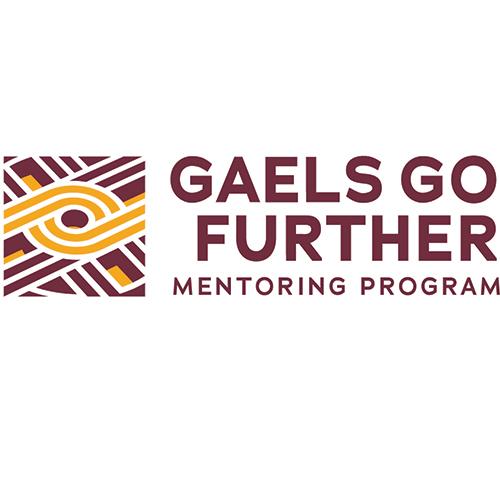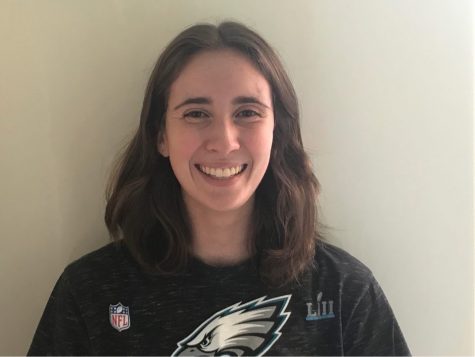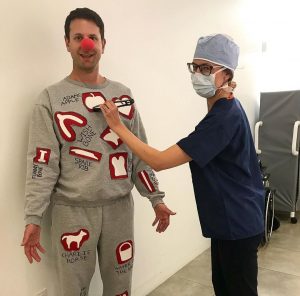Iona launches new mentoring program connecting students and alumni

The Gaels Go Further Mentoring Program will connect students and alumni of Iona College like never before.
September 9, 2021
This summer, Iona College announced a new mentoring program designed to advance students’ professional careers with the benefit of advice and support from successful alumni. The Gaels Go Further Mentoring Program is a valuable opportunity for both students – who can form relationships with employees in many different industries – and alumni – who can give back to the community that launched their journey. The initiative, which will kick off this fall, provides students a combination of both long-term and “flash” mentorships based upon common interests, professions and activities.
Colleen Slattery, a development professional with experience in the academic and business fields, has been hired as the Gaels Go Further Mentoring Program’s inaugural director. Slattery will pioneer the program’s debut, develop the initiative’s growth and enhance the preexisting mentoring opportunities at Iona College.
Jim Oates ’95, a member of the Iona College Alumni Association Board of Directors, assisted in sponsoring the program along with his wife Monica ’95. Their contributions aided in the development of GaelsConnect, a technological platform built to facilitate engagement between alumni and students.
As the pilot program launches this semester, Margaret Dougherty sat down with Colleen Slattery and Jim Oates to discuss the details of this project, the advantage of mentorship from alumni and the future of mentoring at Iona College.
This interview was conducted on Aug. 31, 2021 and has been edited for space and clarity.
MD: I was wondering if I could start by asking you to give a brief general synopsis of the mentoring program.
JO: President Carey put a flag down saying that mentoring is going to be a new cornerstone of the Iona experience, and for me that’s just a fantastic phrase and gives me goosebumps every time I hear him say it. There’s mentoring that goes on all the time and now we’re adding to that offering with new capabilities and new connections. It is centered around a two-credit course that we’re developing and launching in [mid-September], where a student goes through 12 modules – self-guided on the tool – and part of those modules is interacting with mentors. They basically do career exploration, navigate through developing their resume, how to network, how to go through their first job search, or even find out what industry they might want to be in. So that’s the anchor. Secondly, we have what we’ve called GaelsConnect networking, which is around this new platform called GaelsConnect. It’s like our own little version of LinkedIn. Students can join the platform, alumni can join the platform, and basically say “Gaels Help Gaels;” we’re going to be on the platform and if anybody has any questions about what it’s like to work in certain industries, what it’s like to change jobs, what it’s like to go on interviews, how best to position yourself, you can reach out and connect with each other in sort of an informal ad-hoc mentoring kind of interaction. And what’s super exciting about that is it’s not limited to the students. After you graduate from Iona, you are also as in need of mentoring and advice from friends and colleagues and we’re finally making a very easy way for the Iona broader alumni network to connect with each other and help each other once they leave campus. [Slattery] has been working hard on the existing mentoring programs, trying to put them all under one landing pad so you can see all the different avenues and options for benefiting from some sort of mentoring – each formal, informal, ad-hoc or something broader. In a nutshell, I think it’s a game changer.
MD: How long has the idea for this program been in the works?
JO: Well, for years and years mentoring has happened. It’s been more ad-hoc and episodic. Some of those programs were a little more formal, but they have sort of started and stopped. They couldn’t all be sustained. Alumni weren’t always clear on how they might get involved. It wasn’t widely communicated. Last summer President Carey talked about how he wanted to leverage some of his experiences in his prior schools where they had some success developing mentoring programs. He basically commissioned a small working group to get together and that’s when all the different parts of the school were represented – the athletics program, the academics, student development, career development, alumni. I was asked to join the group to represent the alumni board and the alumni community. We started working probably August of last year, where we started with a blank sheet of all of our life experiences on why mentor programs succeed or fail. What can we do to make sure this one’s not going to fail, that ten years from now we don’t say ‘Remember when we tried that Gaels Go Further thing?’ and that we have some way of demonstrating real success, real sustainability, keep it simple, keep it fun. We worked very intensively in the fall of last year thinking about when we might launch for this September and part of that gameplan was attracting [Slattery] to Gael Nation, which was also a great way to ensure the sustainability because we now have a director of mentoring at Iona College. She joined May 3rd and has already done a phenomenal job pulling it all together and connecting the different pieces of the campus and bringing what was sort of a design on paper to real life.
MD: What is your specific role in the program?
CS: My title is the director of the mentoring program, and my real initiative is to bring the alumni and the students together. [Oates] has been amazing as the ambassador for the alumni getting them involved. I am working very closely with a lot of the professors and the advisors to really get the students on board. They know that there’s a lot of resources here but they’re not quite clear on how to get to them. It’s not just this program that we’re working on, it’s the big picture with the whole college…they have a great MOSAIC Program when you’re a freshman…if you’re a student who’s struggling with some of your academics there’s a TRIO Program…the Hynes Institute specializes in entrepreneurship, the career center has tools and resources for you. My main job is really to make sure that all of these amazing resources are not only provided for the students, but they know how to find them. As far as for parents…when you take your child to look at colleges there’s so many and it gets so confusing. At the end of the day, you sit down and say ‘What sets this school apart and why should I send my child here for an education? Will they have a career?’ We truly believe what we’re doing here with this mentoring program is setting the students up for success before they even get here. I think that’s the main goal and objective.
MD: What has the response been from alumni?
JO: It’s been outstanding. The working group was a little bit nervous about whether we would be able to get enough alumni to participate. I swore to them that alumni wouldn’t be the issue; it would probably be students who aren’t really clear on what it means and how to engage. About a year and a half ago coincidentally there was a survey that went out to alumni asking them questions like ‘Do you engage with the school? Why do you engage? Why don’t you? How can we communicate better?’ There was a little question in there that was ‘Would you be willing to serve as a mentor?’ About 1500 alumni responded to the survey – there’s 50,000 alumni so that’s not a lot of alumni responses but as surveys go it wasn’t bad – and in that there were about 200 alumni who said they would be willing to serve as mentors. We took alumni who are known to the school, the alumni board members who serve with me, plus those 200 people and we did a solicitation to them to introduce the Gaels Go Further Program and ask them if they’d be willing to participate in this pilot effort. Out of that 200-250 people we got 80 people who agreed to do it. We’re onboarding them now to GaelsConnect. It’s been interesting that the alumni most often feel like they’re getting approached to donate money, not just at Iona but any school. That can get sometimes frustrating or tiring. All you see from me is a dollar sign and not the person or the value that I can add. Paul Sutera, who’s the head of advancement and alumni relations, said it’s not only about treasure but it’s also about time and talent. We also have about 25% of those alumni who are not from the tri-state area, and they find it difficult to connect with the school because they’re not here. With this GaelsConnect platform and the virtual world we live in now, they can engage as mentors on a remote basis and be connected to their alma mater without actually having to be on campus. The other phenomenon that I encountered was that the first reaction that the alumni had was ‘I’m not qualified to do this.’ The alum might be older, maybe retired and feeling stale and no longer useful and then they describe what they went through in their life, and it would be great to learn. Or someone who’s younger feels like they haven’t had the big successful career yet, but they certainly know what it’s like to navigate through finding jobs more than the 80-year-old does now. Everybody’s got something to offer.
CS: We got a few emails and people were like ‘I’m not long out of school; maybe it’s 3-4 years. I have to tell you I wish I would have known certain things. Would I be a good resource?’ And we were like ‘Yes!’ It’s not only about ‘I want to study finance and I’m going to find someone to mentor me in finance.’ That’s fine and well and we’re going to have the resources for that, but it’s even more than that. Guidance – how to start off your career, how do you network with people, how do you do business internationally, how do you go to lunch with a prospective employer? All those things you don’t read in the book. The feedback from the students, especially the juniors and the seniors…a lot of them lost their opportunities for internships last year. So, they feel like they’re behind the eight ball. ‘How am I going to meet somebody? How am I going to be able to get into a company? I’m never going to be able to do that.’ LinkedIn is a great tool, but how great is this tool? Your Iona LinkedIn where you already have a commonality: same values, same education. That’s priceless.
MD: I understand there’s also a course that students can take related to this program. Could you explain what the course is about and who can take it?
CS: Right now, it’s a pilot program. We have 50 students that are participating in it. There’s a few freshmen sprinkled in there but the majority are juniors and seniors. This pilot was really just to put the course out there, incorporate the mentorship so that you have a resource. It’s a two-credit course. For next semester, we’re opening up to everybody. The class is going to be taught by Professor Mulligan and myself along with resources for the mentors. We’re going to cover a lot of different things: resume writing, interview skills, but also a lot of life skills of being in the workforce. How do you dress for success? How do you conduct yourself? Just guidelines that you may have not known before. We’re going to try to provide guest speakers that are relevant to success and leadership and open their eyes to a lot of different [mentoring] programs on campus. Even within the departments, I’ve gotten to know some of the advisors, and they all do so much for the students. It’s just a matter of knowing that those are good opportunities that are going to add to your skill set.
MD: For students who are interested in this program and want to learn more, what steps should they take?
CS: The first step is to go on the website and find my contact information – there’s email, there’s phone number, there’s my office address. What’s great on the website is we just created a form for students and alumni that they should fill out if they’re interested in signing up. It’s very simple – name, address, what year you’re in, your major – and that comes right to me so I can reach out and convey any information.
JO: Once we’re feeling pretty good [about the GaelsConnect platform] we’re going to start inviting as many students and as many alumni who want to join the platform as possible. If we end up with 5,000 students and 50,000 alumni it’s going to be hugely powerful When you login each time, it basically works like LinkedIn. You can scrape your LinkedIn profile in; it takes all your history and attributes. It’ll ask you a few incremental questions about skills and interests that you might not have on LinkedIn, how you identified yourself while you were at Iona (resident or non-resident, sports, affinity groups and things like that), and you build basically an Iona specific profile. Every time I go on that tool today it is now matching me with another person in the Iona community, a student or alum who has similar interests, skills and background. You could never find those other alumni before. If we could get to 50,000 alumni and 5,000 students…depending on what you’re going through you might find five people who have this in common and ten people who have that in common. Getting on the platform you’re basically advertising that you’re willing to help. So hopefully by this time next year we have 55,000 users. Although even if we have half of that it’ll be good.
MD: Is there anything else you’d like students to know about this program?
CS: I just really want to hit home that Iona is here for a lifetime. It’s not just doing your time and you’re out. It’s a lifetime of support and being connected. With Gaels Go Further everybody’s going to work together to make sure you fulfill your career success and different circumstances in life where you may need support. It’s amazing already how people have connected.
JO: One thing I love about the phrase ‘Gaels Go Further’ is the multiple meanings. The Gael goes beyond just going to school and participates in this mentoring relationship. They go that extra step and the alumni are going that extra step to help other alumni or students. And then in your own life, having done these things you’re going to go further than you otherwise would have. The other thing is…students don’t always know the benefit of having a mentor. It’s not your parents, it’s not your teacher, you don’t have all that baggage and history. You have a person who has no other skin in the game except to want to help who has traveled down a similar path in some way. I can’t think of a successful person that I’ve ever interacted with who didn’t attribute some of their success to advice…or help that they got from a mentor.



